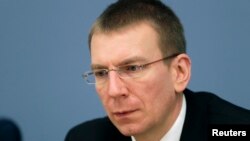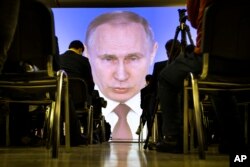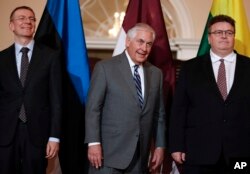Latvian Foreign Minister Edgars Rinkevics says Vladimir Putin's recent comments on retaliating against nuclear-armed adversaries, which the Russian president acknowledged would lead to a "global catastrophe," represent a level of animosity not seen since the early Cold War.
Speaking to a staunch pro-Kremlin TV host in a documentary that aired in Russia just weeks before voters head to the polls in an election that has barred any serious competitors from running, Putin made tough statements in which he presented himself as an indispensable guarantor against foreign attacks.
Asked what he would do in the face of an imminent nuclear attack, Putin said he would trigger a "reciprocal strike," adding that although the resulting worldwide devastation "would be a global catastrophe for humanity ... what do we need a world for if there is no Russia in it?"
Speaking with VOA's Russian service this week, Rinkevics warned that "sometimes this kind of rhetoric can get so heated that you can't retreat from what you have said."
"These kinds of statements are absolutely irresponsible," he added. "This suicidal behavior makes no sense. I don't think anyone is considering attacking Russia. This is just stupid to think like this."
While some observers have dismissed Putin's comments as nothing more than empty threats, Rinkevics said neighboring countries worry that Russian willingness to invade both Ukraine and Georgia over the past decade imbues the comments with an ominous precedent of military follow-through.
"What we saw was that the Russian Federation didn't hesitate to use military force against Ukraine in 2014," he said. "These kinds of threats come from the Russian president, Russian politicians and Russian officials. This is serious, and this rhetoric can lead too far."
Rinkevics and his fellow foreign ministers representing the three Baltic allies exposed on NATO's eastern flank are in Washington to urge Western leaders against being naive about Russian threats.
Democratic nations in peril
Speaking with Agence France-Press after their joint meeting with U.S. Secretary of State Rex Tillerson on Monday, they discussed Russia's so-called "hybrid" threat to the West.
"I think what we have seen in the past four or three years is the community of democratic nations is under the attack," Rinkevics said of Russian interference and interventions.
"The very basis of our democratic institutions are under attack through social media by fake news, and also through the influence of money, and it is very important that we stick together," he said.
The Baltic nations are aiming to bolster that message when their presidents attend a White House summit on April 3.
Having compared Putin's latest threats to rhetoric of the early Cold War, Rinkevics said it is only appropriate to mark 100 years of Baltic independence in Washington.
"It's important that we are celebrating the 100th anniversary of our sovereignty, our independence, here, together with our Lithuanian and Estonian friends, because the role of the USA has been and still is very significant," he said.
At the press conference following their meeting with Tillerson, the ministers also discussed the upcoming NATO summit slated for July.
At that summit, they plan to stress the importance of strengthening allied deterrence on Europe's eastern flank and ensuring follow-through on decisions made at the NATO summit in Warsaw in 2016, such as the Transatlantic Capability Enhancement and Training Initiative, which is designed "to promote capability development, interoperability and training [to] enhance NATO resilience in response to the challenges in the Baltic region."
This story originated in VOA's Russian service.






